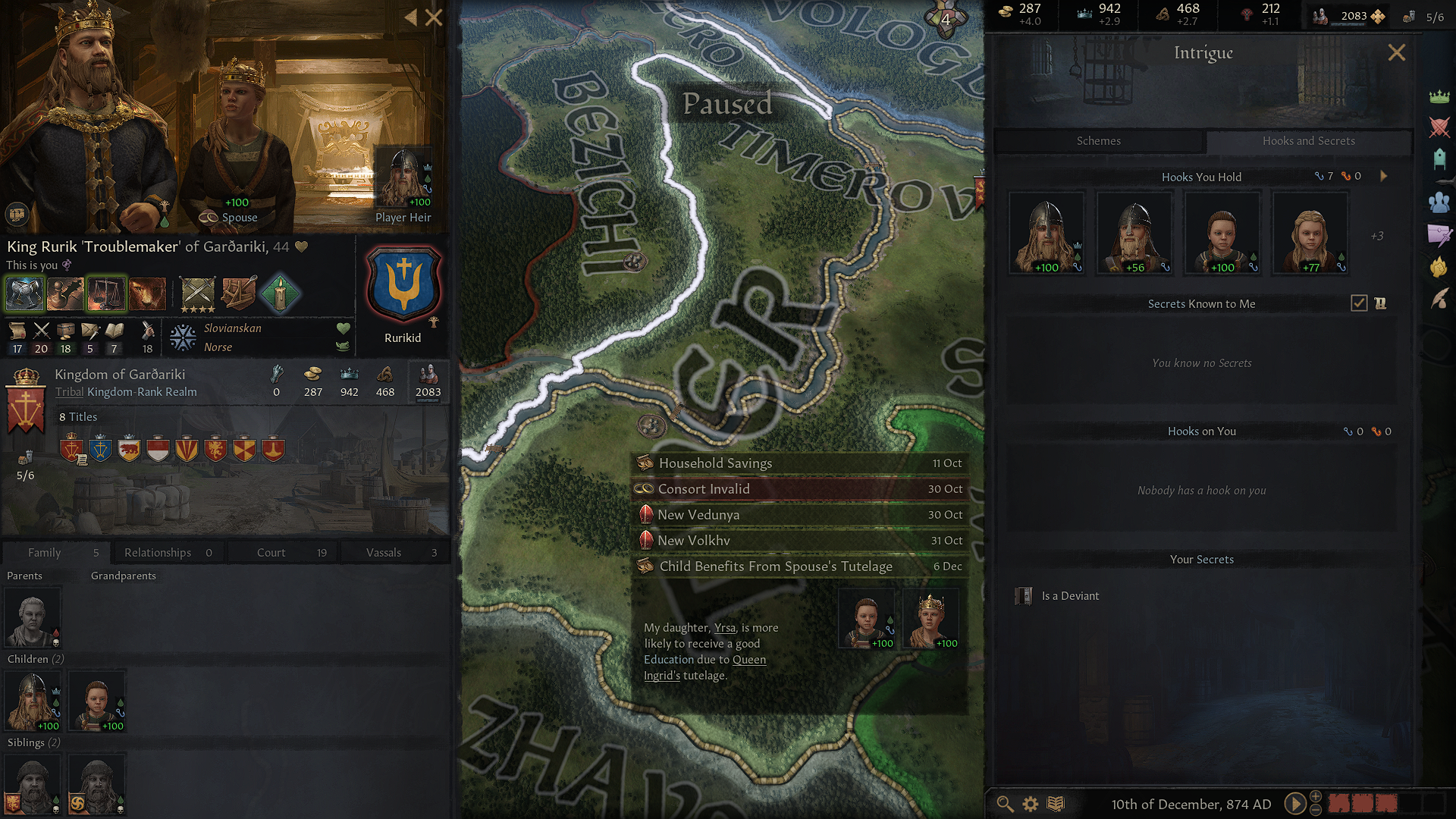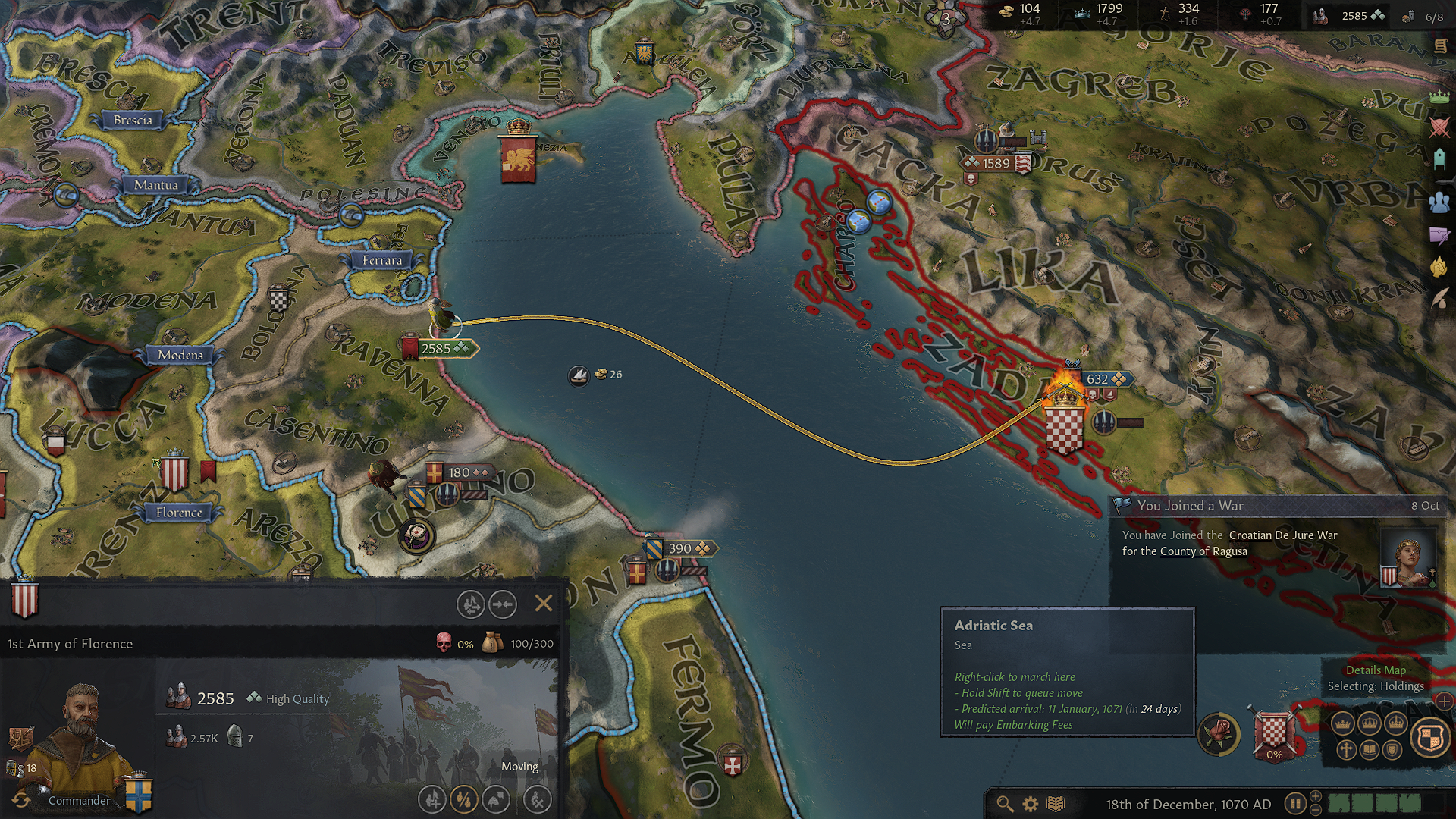Platform:
PC
Released:
September 2, 2020
Publisher:
Paradox Interactive
Developer:
Paradox Development Studio
The Crusader Kings series has been around since 2004, developed and produced by Paradox. Despite its initially average reception, the series has since grown into its niche and is now known as one of the most hardcore kingdom management experiences on the market. Paradox Development Studio is known for their strategy and management games such as Cities: Skylines and Imperator: Rome. They are the flagship studio for publisher Paradox Interactive, and as such, they have many years of development prestige under their belt.
Crusader Kings III has been in development for a long time, posting frequent updates and development blog posts on their website. It was a cool way to drum up excitement for the game, and for them to introduce the new concepts and gameplay elements added for this illustrious sequel.
A small disclaimer before we begin: I have never played a Crusader Kings game before. Going in, I knew that it would be a complex strategy game. I knew it would be a huge world, emulating the countless kingdoms and rulers of the middle ages. But I had no idea of the scale of what I was getting into.
Not even Sid Meier’s Civilization series holds a candle to the complexity of the systems in play here. Crusader Kings III offers a stunningly realistic slice of royal life all across the globe, in all aspects that might entail. Battle, religion, laws, politics, family – it’s all here, ready for you to manipulate to your advantage. Playing as literally any ruler you choose from anywhere on the map, you follow your dynasty one ruler at a time while you aim for greatness. What ‘greatness’ means (that is, what the win-state is) is completely up to you. In the same way that city-building games will often have a game mode where you can play without any set goal until you’re satisfied, so too can you continue your dynasty and rule it as you see fit. As you manage your household and titles, dramatic events like attempted assassinations and budding romances can happen along the way, creating the feeling of a historical drama. It’s kingdom management on the largest scale I’ve ever seen, and its truly a marvel to behold.
You’ll only get to behold that marvel, however, if you can muscle past the game’s incredibly steep learning curve. Until you do, Crusader Kings III will simply be a mess of menus and a truly unmanageable number of characters and kingdoms controlled by systems you cannot understand. To criticise the game for its complex systems wouldn’t be fair; that is, after all, its appeal. But if it’s going to be this complicated, then the one thing they needed to make sure they did right is the tutorial. Unfortunately, their lacking tutorial is a large misstep in an otherwise incredible game.

To explain the game’s countless moving parts is a herculean task, to be sure. But that’s all the more reason to come up with something a little more engaging than never-ending text boxes. Its beginner’s tutorial, which while effective at teaching you the bare basics, still doesn’t come close to properly showing you the ropes.
This is something Paradox was criticized for in Crusader Kings II, and as I have come to understand, it has been much improved. A new ‘issues’ section will inform you of immediate problems with your dynasty, so you can more easily understand and solve them. You can now hover over unfamiliar terms for a brief explanation of their meanings, but it’s just not enough. These explanations will have even more unfamiliar terms to contend with, and you will soon end up with more questions than you started with.
Crusader Kings III marks the first time I have ever felt so overwhelmed by a tutorial that I had to take a nap break.
“I found myself becoming utterly
absorbed in every choice and detail.”
Completely lost, in my first playthrough I chose options at random without any firm idea of their consequences, and just let the in-game years go by. I arranged marriages and went to war with neighbours; sometimes the game explained these mechanics to me and sometimes it didn’t. It was certainly a source of frustration when I lost a county or title without any idea of why or how to fix it.
Yet, despite my frustration, I found myself becoming utterly absorbed in every choice and detail. What you’re developing is not a single country or land, but the legacy of your family for generations to come. It’s a love letter to any gamer who loves to plan and micromanage, as there is always something else to be done. Once you realise that the “win state” of the game is whatever you decide to reach for, the true beauty of Crusader Kings outshines the unfair learning curve… for the most part.
Enough of that. What’s different?
If you’re a returning fan of Crusader Kings, you likely won’t be concerned with how well the tutorial treats its newbies. Crusader Kings III is a game made for the fans, and that’s fine. Your time will be spent playing around with the new features of this new title, and there are many.
A new system of abilities, called Perks, are unlocked by earning points in a particular skill such as diplomacy or intrigue. Once a ruler dies, their perks are lost with them leaving to start fresh with your heir, which adds a nice legacy for each ruler. It acts as a skill tree, and will grant you access to a host of abilities that will help you climb the political ladder through whatever means suit your taste. Schemes and hooks, both new ways to manipulate your rivals and enemies, are another new addition that opens up possibilities who prefer subterfuge to all-out war.
The personalities and motives of each Ruler, AI or controlled by you, have been greatly fleshed out. How a ruler will act and what they think of you is determined by their personality traits, and their opinion of your personality traits. Personalities can even affect the random events that can happen throughout your rule: how the event is described and the actions you can take can change depending on your ruler’s personality. If you take an action that is out of character for your ruler, this will cause them Stress – another new addition to Crusader Kings.

Visually, there is much improved about Crusader Kings III. Character portraits have been freed from the restrictive borders of the previous game, giving the characters some room to breathe. Characters themselves have more variety and detail, and in general are far more appealing to look at. They don’t look as nice as the cinematic trailers for the game, but spending that much effort on the visuals would have been a waste of resources for a game like this. The hairstyle and clothes of you and your family can be customised as well.
It’s unavoidable that you’ll spend most of your time looking at menus, so it’s good to see the UI with a sleek new look. The icons can be tiny and not self-explanatory enough though, which is yet another thing players will need to get used to gradually.
When it comes to the models for your troops though, the seams start to show. Armies are depicted by a single soldier on the map, with a number at his feet depicting the number of men available. The soldier’s movements are jerky and sudden; often he will march awkwardly in place for several moments before zipping across the map. When in battle, he will bash his sword against the enemy until one side loses. It hardly makes for a dramatic battle.
Combat planning itself is more involved, luckily. Battles can swing in unexpected ways due to clever placement of men-at-arms troops and the skill of the commanding officers, rather than just having more numbers than the other guy. Perks can also come in handy here, as can schemes and politics.
There are some ways to spice up your games too, for example making all sexualities equally common among people – including asexuality – and making women hold equal titles to men regardless of cultural or religious opinions on the matter might originally dictate. It’s a refreshing change from the countless works of fiction that exclude these things for the sake of ‘historical realism’.
8
Great
Positive:
- One of the best kingdom simulators out there
- New and improved addition to an already great series
- Limitless replay value
Negative:
- Unfriendly to new players
- Some visual awkwardness
Crusader Kings III is for a niche audience: its own fans, and any new player that has the patience to learn how to play over multiple playthroughs (though it’d be faster to watch tips and tricks videos on YouTube). If you’re not a member of this audience, tread with caution. It’s a lot of looking at menus, clicking options, and waiting for all those in-game years to pass. If you are, however, it’s an experience you don’t want to miss. An imperfect tutorial is an annoyance, but it’s small potatoes compared to the majesty that awaits you on the other side.





